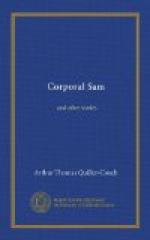‘Lad,’ said the sergeant, watching him as he panted, ’I don’t understand you, except that you’re desperate wrong. But I saw you— saw you by the lookin’-glass, behind there; and ’tis right you should know.’
‘O’ course you saw me. . . . I’m not blamin’, am I? You had to do it, and I had to take it. That was the easiest way. I couldn’ do no other, an’ you couldn’ do no other, that bein’ your duty. An’ the child, there—’
Sergeant Wilkes turned for a moment to the child, who met his gaze, round-eyed; then to his friend again.
But the corporal’s head had dropped forward on his chest.
The sergeant touched his shoulder, to make sure; then, with one look behind him, but ignoring the child, reeled out of the room and down the stairs, as in a dream. In the sunny garden the fresh air revived him and he paused to stare at a rose-bush, rampant, covered with white blossoms against which the bees were humming. Their hum ran in his head so that he failed to notice that the sound of musketry had died down. An hour before it had been death to walk, as he did, under the convent wall and out into the street leading to the lesser breach. The convent had, in fact, surrendered, and its defenders were even now withdrawing up the hill to the citadel. He found the lesser breach and climbed down it to the shore of the Urumea, beside the deserted ford across which the Portuguese had waded on the morning of the second assault. Beyond it shone the sandhills, hiding our batteries.
He sat down on the bank and pulled off boots and socks, preparing to wade; but turned at a slight sound.
The child had followed him and stood half-way down the ruins of the breach, wistful, uncertain.
In a rage, as one threatens off an importunate dog, Sergeant Wilkes waved an arm. The child turned and slunk away, back into San Sebastian.
THE COPERNICAN CONVOY.
[The story is told by Will Fleming, of the Inner Temple, Barrister-at-law, and sometime Cornet of the 32nd Troop of Horse in the Parliament Army, then (December, 1643) quartered at Farnham, on the Hants border.]
CHAPTER I.
I dare say that, since the world began and men learned to fight, was never an army moderately prosperous and yet fuller of grumblers than was ours during the latter weeks of November and the first fortnight of December, 1643. In part the blame lay upon our general, Sir William Waller, and his fondness for night attacks and beating up of quarters. He rested neither himself nor his men, but spent them without caring, and drove not a few to desert in mere fatigue. This was his way, and it differed from the way of my Lord Essex, who rather spilled his strength by lethargy and grieved over it. ’Twas notorious these two generals loved not one another: and ’tis not for me, who never served under Essex, to take sides. But I will say this for General Waller—that he spared himself as little as any common soldier; never forgot the face of a good servant; and in general fed his men well and hated arrears of pay like the devil.




